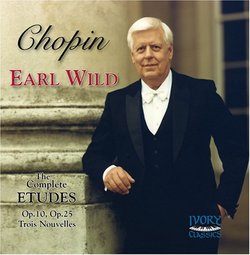Sparkling Set of Chopin Etudes by Earl Wild!
James Yelvington | USA | 08/26/2008
(5 out of 5 stars)
"The venerable piano virtuoso Earl Wild continues to challenge commonsense notions about aging as he keeps on delivering excellent performances of major works, such as those embodied in this new remastering of the 1992 recording of all 27 of Chopin's études (Op. 10, Op. 25, and the three later études). Playing a favored Baldwin concert grand piano in Fernleaf Abbey located in his home town of Columbus, Ohio, he made the original 20-bit digital recordings over a period of just five days. The sound is lively, resonant, and spatially well-imaged, with clear details and sensuous tone quality. Since I've not had access to the original 1992 recording, I cannot say how this 24-bit remastered disk (Ivory Classics 76003) compares with it, but it seems likely--on technical grounds, at least--to be a significant improvement.
Mr. Wild was 77 when he made this recording, but his technique appears to have been more than adequate to the task. His articulation of rapid passages is neat, clean, and even, with enough pedal to yield smoothness, but not so much as to blur details. His greatest contribution here, though, is in the poetry and musicality of his interpretations. He captures the musical essence of these fine miniatures--the shortest is less than one minute and the longest hardly more than five--and conveys it delightfully. This is perhaps the most enjoyable recording of the études available!
Chopin's études remind me somewhat of Bach's Well-Tempered Clavier, with its 24 preludes and fugues touching all major and minor keys. Chopin, however, while working in the majority of keys, does not attempt to include every one. Notable omissions are D major and minor, G major and minor, B-flat major and minor, as well as F-sharp minor, A major, and B major. Perhaps his favorite keys for the études are A-flat major, F minor, and A minor, each of which gets three. (Note that this doesn't prove an overall key preference among Chopin's works, which include several important works in keys omitted from the études.)
As a sometime wannabe pianist, I've attempted three or four of these works, with results I'd rather not discuss. Still, that limited exposure to the scores has embued me with admiration for the works, as well as for those who successfully perform them. These études are treasured monuments of the piano literature!
The liner notes include an excellent discussion of the études by James E. Frazier, and a good summary of Mr. Wild's long and outstanding career to date.
Congratulations are due to Mr. Wild for this five-star contribution to the recorded piano literature!
"


 Track Listings (27) - Disc #1
Track Listings (27) - Disc #1